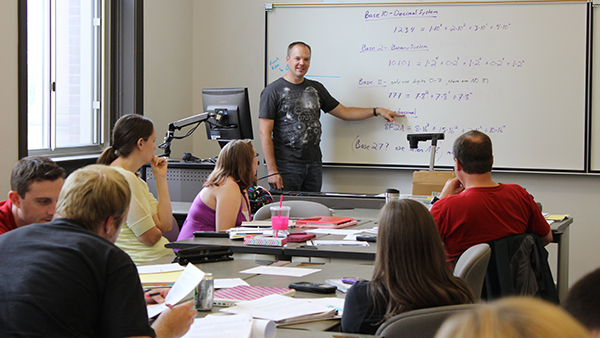
Three UNL graduate courses come to ESUs 9, 10 and 11
Three UNL graduate courses for secondary mathematics teachers are coming to Grand Island, Hastings and Holdrege this summer through the Nebraska Math and Science Summer Institutes (NMSSI), which offer graduate mathematics and pedagogy courses using a teacher-friendly delivery model. Each course is only one week long, with 40 hours of face-to-face instruction to meet your professional development needs.
STAT 811T: Statistics for Middle Level Teachers (grades 6-8) will be in Grand Island from June 1-5, and for grades 6-12 teachers, MATH 805T: Discrete Mathematics will be in Hastings and MATH 806T: Number Theory and Cryptology will be held in Holdrege from June 15-19. Each course is from approximately 8 a.m. to 5 p.m. daily and includes free lunch. Courses will meet at an ESU office or a district administration office.
To enroll in UNL graduate courses, follow the four steps outlined on the Nebraska Math and Science Summer Institutes website, http://scimath.unl.edu/nmssi. Check out our course catalog, which supplies the needed class numbers for either Teach Nebraska registration or MyRED enrollment.
For all on-site NMSSI courses, current Nebraska teachers automatically qualify for a tuition fellowship from UNL equal to 20 percent of in-state, graduate tuition. Additionally, Nebraska K-12 teachers can apply for supplemental NMSSI Fellowships to further defray tuition costs for NMSSI courses. The NMSSI Fellowship Application is now open at http://go.unl.edu/scimathapply.
COURSE DESCRIPTIONS:
MATH 805T (Class # 15454, Sec # 951 in Hastings) Discrete Mathematics for Teachers: This course is designed to deepen knowledge of discrete mathematics as it relates to topics covered in middle through high school curricula. Many of the course topics are introduced through "hands-on" explorations (which characterize discrete mathematics) through which various problem-solving strategies are emphasized. The course also develops an understanding of the role of precise mathematical language, reasoning, and proof in the development of discrete mathematics. The exploratory exercises in the course provide useful vehicles for promoting communication as groups will collaborate to explore problems and present various solutions to the class. Jessica Thompson, Noyce Master Teacher, of Superior Public Schools will be the lead instructor of the course.
MATH 806T (Class # 3347, Sec # 951 in Holdrege) Number Theory & Cryptology for Secondary Teachers: This course focuses on basic number theory results which are needed to understand the number theoretic RSA cryptography algorithm (an encryption algorithm which is in use today to secure information sent via the internet). The course emphasizes connections to middle level mathematics and promotes a deep understanding of the integers and their properties. Elementary methods for encoding and decoding are introduced to elucidate the nature of cryptology. These methods are readily adaptable for use as enrichment activities in the classroom. The connection of number theory to RSA encryption is a very relevant, real-world application of mathematics. Jason Vitosh, Noyce Master Teacher, of Falls City Public Schools will be the lead instructor of the course.
STAT 811T (Class # 15455, Sec # 931 in Grand Island) Statistics for Middle School Teachers: This course offers an introduction to probability and statistics. It follows an inquiry/discovery design dedicating much of class time to activities, discussion and group work. The course emphasizes both topics in probability and statistics that are part of the middle-school curriculum and also statistics that are used in education and school-based research. Stat 811T is not open to teachers who have previously completed Stat 892 or Stat 812T. Dan Schaben, Noyce Master Teacher, of Arapahoe Public School will be the lead instructor of the course.
Contact us at nebraskamath@unl.edu with questions.
:::::::::::::::::::::::::::::::::::::
Be a lifelong learner.
Center for Science, Mathematics and Computer Education
http://scimath.unl.edu/nmssi